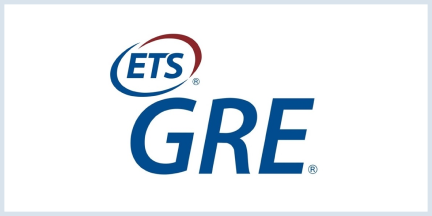Looking to save on your GRE exam booking? Our GRE voucher code offers a flat 7% discount on the GRE General Test fee, helping you reduce costs while registering for the exam. EduVouchers is an ETS-affiliated partner, which means we provide official GRE coupon codes and GRE promo codes that are 100% legitimate for use on the ETS website.
Whether you're searching for a GRE discount code in India or need a voucher for international test centres, you can instantly save money on the GRE fee. For example, pay only ₹21,699 instead of ₹23,452 in India (inclusive of taxes) with our GRE discount code. Our GRE discount codes are valid worldwide at any ETS-authorised test centre and for the GRE General Test taken at home.
Purchase your GRE voucher code today to enjoy a cheaper, hassle-free test registration. Click the Buy Now button to grab your discount and get started! Special
- Offer: Extra ₹100 Off!
- Use code: GRE100 at checkout
What is a GRE Voucher Code?
A GRE voucher code is a prepaid code that you can use to pay for your GRE exam. Instead of paying the full exam fee to ETS, you purchase the voucher at a discounted price from EduVouchers with 7% off. During the GRE registration on the ETS site, you enter this GRE promo code in the payment section, and the voucher covers your entire exam fee.
It's an easy way to get a guaranteed discount on the GRE test fee. The GRE discount codes we provide are valid worldwide at any ETS-authorised test centre, as well as for the GRE General Test taken at home.
Benefits of Buying a GRE Coupon Code from EduVouchers
- Official & Trustworthy: EduVouchers partners directly with ETS (makers of the GRE) to bring you verified GRE voucher codes. Our GRE coupon codes are ETS-approved and valid across all test centres (and GRE at Home), so you can use them with confidence on the official registration site without any worry about validity.
- Flat 7% Discount (Best Value): We offer a flat 7% off on the GRE exam fee – an exclusive GRE discount code deal you won't easily find elsewhere. Why pay full price when you can get the same GRE test for less? Whether you need a GRE discount code India or for any other location, our pricing remains competitive.
- Instant Digital Delivery: Need your code fast? Once you purchase, your GRE promo code is emailed to you within 2 minutes. No waiting around – you get your unique code almost immediately and can proceed to book your GRE slot right away. This instant delivery means even if you're booking a last-minute GRE date, you'll have the GRE voucher code in time.
- Hassle-Free Process: Buying and using our GRE exam coupon code is simple. Our website is user-friendly and secure – just a few clicks to sign up, select the GRE product, and check out with trusted payment options (credit/debit card, net banking, UPI, etc.). Redeeming the GRE discount code during GRE registration is straightforward (see the step-by-step guide below). Everything is designed to be quick and easy, so you can focus on preparing for the exam, not worrying about how to save on fees.
- Dedicated Support & Extras: We pride ourselves on customer support. Have questions or any issue? Our support team is available via phone, email, or chat to help you through purchase or registration. Additionally, as an EduVouchers customer, you get complimentary guidance for your study abroad journey – from basic admission counseling to education loan assistance and accommodation advice. We're here to support you beyond just the exam voucher, making your path to graduate school smoother.
How to Buy Your GRE Voucher Code in India?
- Sign Up or Log In to EduVouchers: Create a new account or log in to your existing EduVouchers account.
- Choose Your GRE Voucher: Browse available GRE vouchers and click on "Buy Now" for your preferred option.
- Enter Your Details: Fill in the necessary information as prompted to complete your order.
- Complete Your Payment: Proceed to the payment page and pay securely using your preferred method.
- Enter Coupon Code: Use code GRE100 at checkout to get an extra ₹100 off your already discounted price.
- Receive Your GRE Voucher Instantly: Your GRE voucher code will be delivered to your email within 2 minutes, ready for you to use.
Tips to Save More on GRE Discount Codes with EduVouchers
- Buy directly from EduVouchers: Get verified GRE discount coupons and save 7% on your exam fee.
- Plan and Purchase Early: Lock in the best rates by buying your GRE voucher code in advance.
- Grab Limited-Time Offers: Watch out for seasonal deals and special GRE promo codes for additional savings.
- Use the GRE100 Code: Don't forget to apply this code at checkout for an extra ₹100 off.
- Share with Friends: Refer fellow test-takers to EduVouchers, and both save on your GRE exam fees.
Terms & Conditions for GRE Discount Vouchers
Before purchasing and using the GRE exam voucher, please be aware of the following terms and conditions to ensure a smooth experience:
- Voucher Validity: Each GRE voucher code is valid for up to 6 months from the date of purchase. You must redeem the code to register for a GRE test before it expires. Expired vouchers cannot be redeemed or extended.
- One-Time Use: A GRE discount voucher can be used only once. It will cover the registration fee for a single GRE General Test appointment. Once you apply the code and book an exam seat, the code is considered used. It cannot be reused for another booking or a different exam.
- Combination with Other Offers: GRE vouchers cannot be combined with other GRE promo codes or fee waivers. Only one code can be applied per exam registration.
- Rescheduling & Cancellation: If you need to reschedule a GRE exam that was booked with a voucher, you may do so through ETS by paying their rescheduling fee (currently $50). You typically do not need a new voucher or to repay the full exam fee to reschedule – your original GRE coupon code remains applied to the booking as long as you change the date instead of cancelling. However, if you choose to cancel your GRE registration outright (and you do so at least 4 days before the test date), ETS's refund policy applies: you can get a 50% refund of the test fee from ETS, but your voucher is still considered used (it won't be reissued for another exam).
- Validity at Test Centres: Our GRE voucher codes are valid worldwide for any GRE General Test appointment. It doesn't matter if you book a test in India, the US, Europe, or opt for the GRE at Home — the GRE discount code will cover the corresponding exam fee as long as it's a GRE General Test registration through ETS.
- Customer Support and Refunds: EduVouchers is committed to customer satisfaction. If, for some reason, you are unable to use your GRE voucher code or face any issues, contact our Help Centre or customer support. We do offer refunds under specific conditions – for instance, if you have not used the voucher at all and the request is made within a reasonable period. Full refund if the voucher is unused and not close to expiry, minus any processing fees. Please refer to our detailed Refund Policy page for the latest terms on voucher refunds.
GRE Exam Fees 2026
The current GRE General Test fee in India is ₹23,452 (inclusive of taxes). With our GRE discount code India, you can reduce this to just ₹21,699 – saving over ₹1,500 on your exam registration.
Additional fees may apply for special services:
- Rescheduling: $50
- Changing Test Centre: $50
- Additional Score Reports (per recipient): $35
Don't pay full price when you can use our GRE coupon code to save significantly on your exam fee.
GRE Exam Dates 2026
The GRE General Test is available year-round at test centres and for at-home testing on a first-come, first-served basis. This flexibility allows you to:
- Choose a test date that fits your application deadlines
- Book your preferred test centre location or opt for at-home testing
- Reschedule if needed (subject to ETS rescheduling fees)
Important: Allow sufficient time for score reporting to meet your graduate school admissions deadlines. Scores are typically available within 8-10 days after your test date.
Purchase your GRE voucher code now to secure your preferred test date and save 7% on the exam fee!











![GRE Exam Fee [current_year]](http://eduvouchers.com/cdn/shop/articles/GRE_exam_fee_82ba3f60-a7d6-4328-b7e6-0e420f7d81aa.webp?v=1767166656&width=1500)
![GRE Exam Dates in India [current_year]](http://eduvouchers.com/cdn/shop/articles/GRE_exam_3_d4b60e61-832f-449e-918d-ad787c8362ed.jpg?v=1771312718&width=1500)










